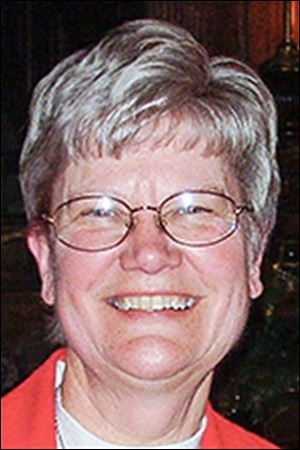
COMMENTARY
Sister Ginny, Padua, and the star fish that gets saved
6/29/2014

Eight years ago, Sister Virginia Welsh was sent to the Toledo neighborhood once known as Kuschwantz and now known as Kwanzaa Park with a simple but very large writ: Find out what they need there and do it.
The Catholic Church was closing parishes. Four formerly mighty Polish parishes had dwindled to a few handfuls of families. St. Anthony of Padua Church was, Sister Ginny told me when I visited her the other day, the CedarCreek of its era. It once had 4,000 members. By 2006, it had fallen to about 100 families.
But could the church keep a presence in the neighborhood in the form of service?
Sister Ginny walked the neighborhood and asked the people what they wanted. (They needed many things.) The eventual result was the Padua Center, which is a place as hard to define as Sister Ginny herself. I guess I would call the Padua Center a neighborhood hospitality house, centered on kids and education.
The Padua Center is in the old St. Anthony of Padua rectory. Two major programs — both for children — are run there. One is for students who have been suspended from school in grades K through 6. This program keeps the kids up to date with school work and simultaneously tries to work on their behavioral issues. Sister Ginny tells me they teach peace education. “We tell them: You have power, and when you misbehave, you lose that power. We teach them how to restore their power.”

Sister Ginny
The second program is a summer tutoring program and day camp for kids in grades K through 8. The hope is to prevent summer academic slippage. On the day I visited, about 25 kids were there. During the school year, a thousand or so kids might come and go in the course of a year. Padua does this with three paid staff members, interns, and volunteers.
One boy who came to Padua during the school year, dealt with his issues and went back to school, asked if he could come back to Padua. Why? Sister asked him. “Because,” he said, “no one bugs me here, I can get my work done, and if I need help, I can get it.” He was in fourth grade.
Many of the kids come back, just to say hello and thank you.
Padua also runs occasional special programs, including, in the past, nutritional awareness for adults and “how to be gentlemen,” for boys.
Sister Ginny is a no-nonsense, straight shooter. She has no time for social or political pieties. She told me she didn’t come to Kwanzaa Park to maintain people in their poverty but to help them break out of it. She was an old teacher. Learning, she thought, was the key. Empowerment, not charity. She still thinks that.
Padua also offers a neighborhood coffee hour ever day for those who want it. It sponsors an NA meeting and a UT scholarly study group. Most significantly, perhaps, it runs a large community garden where the whole neighborhood can come to get healthy food. And, in fact, to compost, plant, and recycle. Sister Ginny told me: “I am a Franciscan. We grow things.”
She is trying to teach children and their parents how to do the same — and, generally, about healthy living and the connections of nature. In addition to the Ujima (collective work) garden, across the street, Padua does some vertical hydroponic farming at the center, and they raise chickens. The kids love the chickens and they learn that eggs come from them and not Kroger. Sister told me that most of her kids were surprised to learn that oranges come from things called orange trees, which cannot grow in Toledo. The Padua gang even have a worm farm. The children think it is “gross” but fascinating.
Padua gets no money from the diocese, but runs its own small fund-raisers and survives on these, occasional grants, and small service contracts with TPS and Lucas County Children’s Services.
Grant givers want data. Sister Ginny sees people. She tells me about the mythical lady who threw star fish back into the sea after high tide. The woman was told by a friend that she was fighting a losing battle. Hundreds of star fish wash ashore every morning and evening. You can’t throw them all back. So what difference does it make? Sister’s answer: It makes a big difference to the one that is thrown back.
On Tuesday: How intervening institutions like Padua can help kids and build neighborhoods.
Keith C. Burris is a columnist for The Blade.
Contact him at: kburris@theblade.com or 419-724-6266.